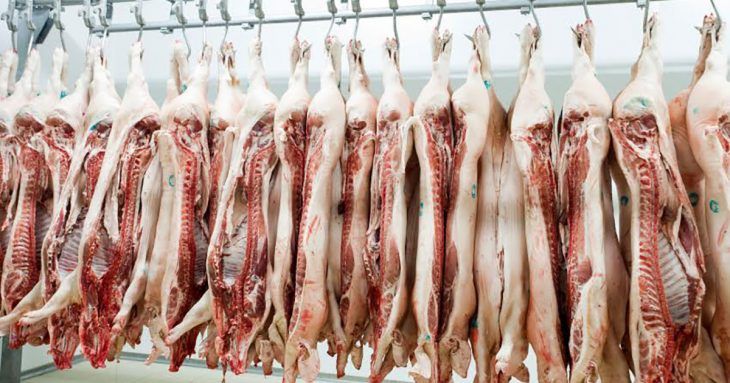Reactions vary regarding executive order for meat plants to remain open
by April 30, 2020 3:36 pm 769 views

The executive order handed down this week from President Donald Trump known as the National Emergency Production Act as amended to cover the food supply chain ordered meatpackers and processors to remain open during the COVID-19 crisis.
The executive order also comes with additional liability protection for meat companies that remain open and follow operating protocol put into place and overseen by the Department of Labor, the Occupational Safety and Health Administration and Centers for Disease Control and Prevention. The order was seen by investors as a benefit for meat packers.
The joint meat processing guidance says employers who adhere to the protocol in good faith and remain open as the order stipulates will have the support of the Department of Labor should the company be sued for workforce exposure.
The Defense Protection Act was met with opposition from interest groups who said the order will force workers back to unsafe conditions.
“Workers in the American food industry are vital to us all, but the terrible working conditions that already existed in that industry have only been exacerbated by the COVID-19 virus. Donald Trump is finally using the Defense Production Act, but not to ensure that American manufacturers produce the protective equipment that essential workers so desperately need to be safe. Instead, Trump is using the DPA to try to force workers back on the job in unsafe conditions. It doesn’t get more wrong than that,” said Jason Walsh, director of the Bluegreen Alliance, a trade group that champions environmental and labor union issues.
The AFL-CIO said the executive order is short-sighted because the intention is to keep production from slowing, but that measure will end up slowing production if more workers continue to fall ill from exposure while working.
WORKFORCE DEATHS
Tyson Foods, the nation’s largest meat packer, told Talk Business & Politics the emergency order was appreciated. Prior to the order being issued, Tyson Foods board chairman John Tyson noted in advertisements with large newspapers that the food supply chain was at risk of breaking.
“We continue our efforts to keep feeding American families. The safety of our team members will remain our top priority as we work with the USDA on next steps. We’ve been screening worker temperatures, requiring protective face coverings and conducting additional cleaning and sanitizing. We’ve also implemented social distancing measures, such as workstation dividers and more break-room space,” said Tyson spokesman Gary Mickelson.
Tyson voluntarily closed some of its slaughter and processing plants in communities were COVID-19 outbreaks have occurred. The Springdale-based meat giant has reportedly lost two employees to the COVID-19 outbreak in Joslin, Ill., where it operates a fresh meat plant slaughter and processing facility. Tyson Foods has not issued a statement on employees lost from COVID-19 and complications, nor has the company said how many of its 116,000 employees have tested positive.
The Food and Commercial Workers Union (UFCW) said 20 meat and food processing workers have died from COVID-19 as of April 14. The Union said at least 5,000 meatpacking workers and 1,500 food processing workers have been directly impacted by the virus from testing positive to the disease to missing work due to self-quarantine while they await test results.
‘ENOUGH FOOD IN THE SYSTEM’
Cargill CEO Dave MacLennan said April 24 his company’s restaurant demand began to rebound in the past three weeks. He said as states start to reopen over the next month or so, he expects this business will continue to improve, noting it has a long way to go. MacLennan said the food supply chain is under strain, but so are lots of other industries undergoing challenges. He would not characterize the food supply chain as “breaking” as Tyson said.
“We still have the ability in this country to produce plenty of food. There will be some temporary closings but the people in this industry are resilient and I don’t think the supply chain is broken,” he said during a Bloomberg television interview. “There is enough food in the system. Consumers may not find a particular cut of beef, pork or chicken at times but plants are running and will continue to do so while taking safety precautions for employees.”
He said the meat industry is open and would have regardless of the emergency order but it will also have to balance the health of its workforce with the demands at retail, adding this is a delicate balance every food company takes seriously. MacLennan said the USDA has been supportive through the crisis making sure inspectors are onsite and available through the temporary closures.
